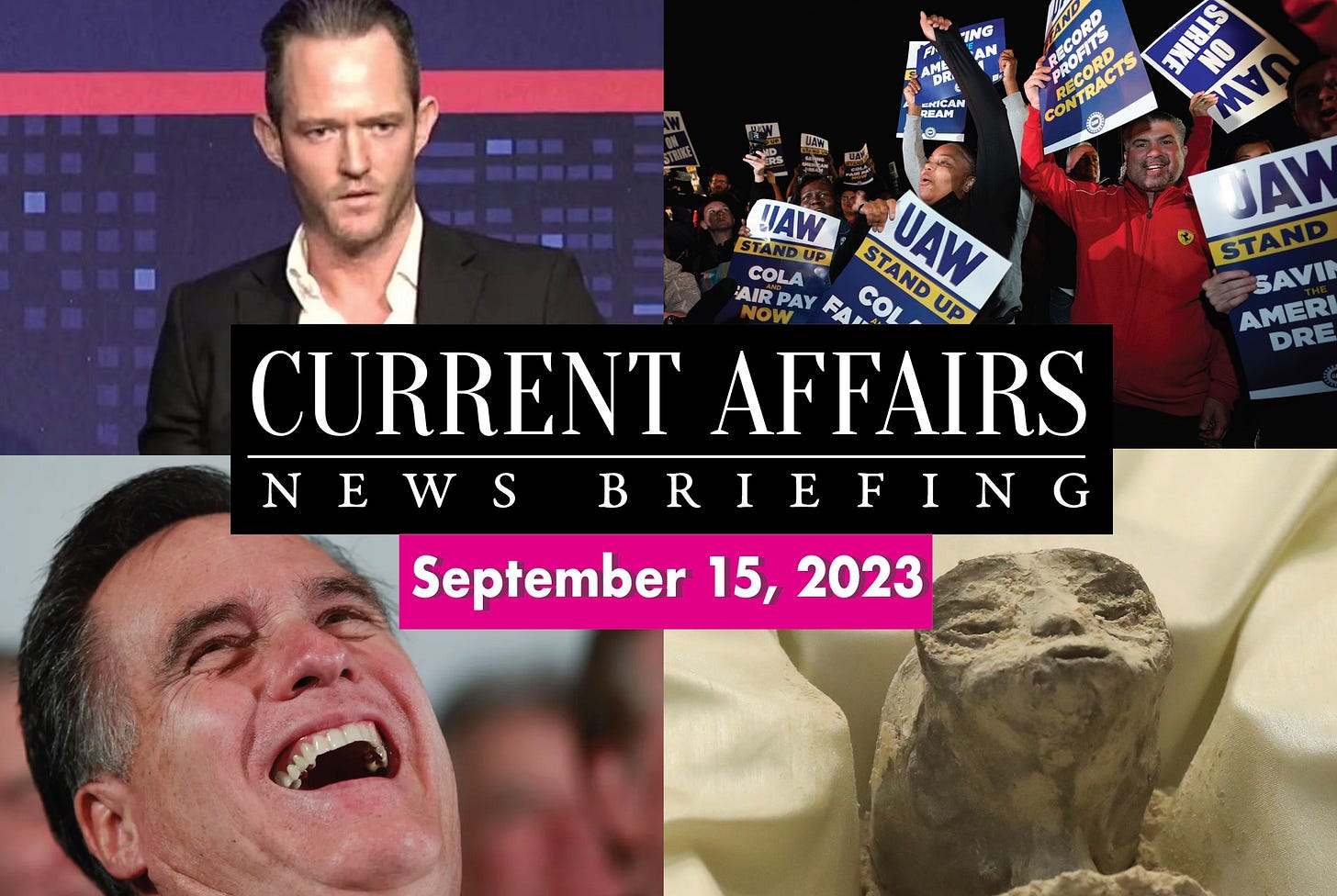Sept. 15, 2023 ❧ Guatemala's democracy, child poverty, and the United Auto Workers on strike
Plus a killer cop in Seattle, an alien hearing in Mexico, legal troubles for the Bidens, the retirement of Mitt Romney, and school in the Metaverse.
STORIES THAT SHOULD BE BIGGER
CHILD POVERTY HAS GONE BACK UP SINCE THE END OF THE CHILD TAX CREDIT
Many of President Biden’s most ardent defenders are incredulous about why the president is not receiving more credit for the economy. Unemployment remains low, they will say, while inflation is on the downswing! What’s not to like? Clearly, the benighted American public—nearly 70 percent of which says the economy is “getting worse”—is just beset by frothing Biden Derangement Syndrome.
But just looking at those top-line macroeconomic indicators does not tell the full story of what Americans are actually experiencing in their daily lives. For one thing, just because wages are catching up with inflation doesn’t erase the more than two years during which they trailed behind. After eviction moratoriums expired, the rate of evictions increased to 50 percent higher than pre-pandemic rates in some cities over the summer. Student loan payments are starting up again. As of July, more than 3 million people had been kicked off Medicaid—mostly for failing to fill out the proper paperwork—as the federal government once again allowed states to begin purging rolls.
But perhaps the most gutting statistic we’ve seen over the past year has been the resurgence of child poverty across the United States. As part of the American Rescue Plan, the pandemic stimulus package passed by the Biden administration in 2021 increased the Child Tax Credit—which goes to married couples with incomes under $150,000 annually—from $2,000 to 3,600 for each child under six and $3,000 for each child between 7 and 17. The program was a roaring success, reducing child poverty to its lowest point on record. According to the Census Bureau, nearly 3 million children were lifted out of poverty during 2021 as a direct result of the expanded CTC, and the percentage of children in poverty was cut nearly in half, from 9.7 percent to 5.2 percent.

But Congress did not continue the Child Tax Credit expansion—allowing it to expire at the end of 2021—Joe Manchin and Kyrsten Sinema, a pair of Democrat deficit hawks who have killed many of the social spending measures proposed by Democrats when they held a governing trifecta, voted with Republicans to kill it—with Manchin making baseless claims that some parents would use the money to buy drugs.
Recent numbers show that canceling the Child Tax Credit expansion has been catastrophic. A new Census Bureau report shows that not only did the child poverty rate increase in the U.S. for the first time in thirteen years, but it almost tripled between 2021 and 2022—jumping from just 4.6 percent to 12.4 percent. Manchin says he has no regrets about canning the Child Tax Credit, even after seeing this new data, seeming to blame parents for their lack of personal responsibility. “It’s deeper than that, we all have to do our part,” he told Semafor. “The federal government can’t run everything.”
The death of the Child Tax Credit can’t really be laid at the feet of Biden—though it’s fair to wonder if he and other Democrats could have put more pressure on Manchin and Sinema to not kill arguably his most successful economic program. Nevertheless, expecting Americans to have a positive view of the economy in light of this simply because of some surface-level economic data is insane. The surface reality is more visceral than some lines moving on a chart. 11 million children live in poverty—more than one in six—in the richest country in the world. To expect anyone to look at this state of affairs as an economic success is not reasonable.

CONSERVATIVE ADMINISTRATION TRYING TO STOP DEMOCRATIC TRANSITION IN GUATEMALA
After a dominant victory in last month’s runoff election, Guatemala’s new left-wing president-elect Bernardo Arévalo is facing attempts by the outgoing administration to prevent him from taking power. Arévalo has called for Attorney General Consuelo Porras to resign after he ordered a raid on facilities storing ballots in an effort to discredit Arévalo’s electoral victory—it’s the second time government agents have been sent to illegally seize boxes of votes without the Supreme Electoral Tribunal’s consent. The effort began after the losing candidate, Sandra Torres—who was herself arrested for alleged campaign finance violations in 2019—made unsubstantiated claims that Arévalo’s victory was marred by voter fraud, which none of the country’s independent election observers have corroborated.
The assault is the latest in a long line of attempts by the outgoing conservative administration to delegitimize the election result. After Arévalo’s surprise second-place finish in the first round of elections, the government suspended his party, known as Semilla (the “Seed Movement”), and ordered a raid on its headquarters. Arévalo has called the attempts to undermine his democratic transition a “coup,” something he’d know a thing or two about. His father, President Juan José Arévalo faced nearly 30 coup attempts while in office after being elected as Guatemala’s first democratic president. His successor, Jacobo Arbenz, was deposed by a U.S.-backed right-wing military junta in 1954, which plunged Guatemala into nearly five decades of elite dictatorship that did the bidding of multinational corporations—most notably the United Fruit Company, which had pushed for the coup in order to reverse Arbenz’s land distribution policies.

Now many of the same forces have arrayed themselves against his son—a reformer who campaigned against a group of elite power brokers often referred to by Guatemalans as the “pact of the corrupt:” Victor J. Blue writes in The Intercept:
The pact of the corrupt is shorthand for the shadowy alliance of business, mafia, and military interests united to rob the country and maintain a status quo of opacity and impunity, driving violence, eroding the rule of law, and convincing millions of young people that immigration to the U.S. is their only shot at a better life. Three of the four Guatemalan presidents who served from 1999 to 2015 did time for corruption. Voters were fooled in the last two elections by candidates who promised justice but in the end seemed to join in the game.
Arévalo’s Semilla Party has emerged as Guatemalans have sought a return to some form of genuine popular democracy and material politics that serve the interests of its common people. Grahame Russell and Michael Bakal write in Truthout:
The Semilla party emerged out of a largely urban-based, 2015 wave of anti-corruption protests that ousted the United States- and Canadian-backed President Otto Pérez Molina and Vice President Roxana Baldetti, who were convicted of operating a crime ring that stole millions of dollars in public funds. Pérez Molina, a former army general, is also an alleged war criminal implicated in massacres of Maya communities, assassinations and forced disappearances committed by U.S.-backed military regimes in the 1970s, ‘80s and early ‘90s…Bernardo Arévalo, made the eradication of such corruption a centerpiece of their social democratic campaign. According to its publicly accessible policy platform, by rooting out corruption and reinvesting in public institutions, the Semilla movement aims to build a national system of free, universal health care; strengthen K-12 education; support agroecology and small-scale farming; expand access to credit and jobs programs; and encourage the democratic participation of long-marginalized sectors of Guatemalan society.
FIGHTING BACK
UNITED AUTOWORKERS ON STRIKE
In Detroit, negotiations have not gone well. At midnight last night, the United Auto Workers’ contracts with the Big Three car manufacturers—Ford, GM, and Stellantis—expired, and the union went on strike against all three firms at once. Currently, the workers are pursuing what UAW President Shawn Fain calls “the stand-up strike,” a reference to the famous Flint, Michigan sit-down strike of 1936-7. In this strategy, only a few strategically chosen plants will be struck at first, before more and more locations are added as time goes on. This keeps management guessing, since they have no way of knowing which workers will go on strike next, and helps the union preserve its strike fund, currently estimated at $825 million. Of the union’s 145,000 members, around 13,000 have walked off the job.

The automakers have only themselves to blame, as they refused to seriously consider the workers’ demands, offering a series of condescending half-measures right up to the deadline. In their last proposal, GM offered a 20 percent wage increase, significantly less than the 36 percent the union called for, and did not attempt to address the demand for a four-day, 32-hour work week. Ford offered to eliminate the hated two-tier wage system, in which newly hired workers make significantly less than their predecessors in the same job, but like GM, would entertain only a 20 percent pay raise—and the union disagreed that tiers would actually be “fully eliminated,” as the company claimed. The details of Stellantis’s last offer haven’t been released, but they were likely in a similar range. Maybe with their factories and warehouses ground to a halt, the companies will reconsider.
The Teamsters have also declared their solidarity, announcing that they won’t deliver Big Three vehicles after a strike breaks out. This is significant because it shows that the UAW strike isn’t just an isolated incident; instead, it has the potential to send shock waves through the American labor movement as a whole. And unlike the rail strike from last year, Joe Biden likely has no legal authority to stop it.
To learn more about why auto workers are striking, check out this video from More Perfect Union:
THIS WEEK IN EVIL
Australian real estate developer Tim Gurner —a man with a net worth of $584 million thinks workers need to feel some “pain in the economy” to remind them who’s in charge. Here’s what he had to say at the Financial Review’s Property Summit:
“I think the problem that we’ve had is that people have decided they really didn’t want to work so much anymore through COVID, and that has had a massive issue on productivity. . . . They have been paid a lot to do not too much, and we need to see that change. We need to see unemployment rise. Unemployment needs to jump 40-50 percent, in my view. We need to see pain in the economy. We need to remind people that they work for the employer, not the other way around. There’s been a systematic change where employees feel the employer is extremely lucky to have them, as opposed to the other way around. So it’s a dynamic that has to change. We’ve got to kill that attitude, and that has to come through hurt in the economy.”
This is a degree of candor from the owning class that we rarely see. Their goal is often to mystify the fundamental conflict between employers and employees by trying to make the case (despite the evidence) that when the rich benefit, so does everybody else. Gurner doesn’t do that. He comes out and plainly says workers need to suffer so the rich can thrive. It’s on the level of that time Warren Buffett candidly admitted “There’s class warfare, all right, but it’s my class, the rich class, that’s making war, and we’re winning.” But Gurner’s statement is on another level entirely, laying bare the view among our economic elites that the point of the economy is to serve them, and the role of workers should be to kiss their feet and beg for whatever scraps the boss feels comfortable dropping to them. Gurner—despite being a second-tier robber baron in terms of sheer wealth—is a virtuoso at producing unbelievable soundbites that perfectly encapsulate the staggering contempt the rich have for everyone else: he is also the brain behind the famous suggestion that young people who couldn’t afford the cost of living needed to simply stop buying avocado toast.
While defending his class, he unintentionally creates some of the most effective pro-union agitprop around by making the uber-rich look like mustache-twirling villains who view their workers as expendable commodities. His quote, which dismisses the idea that employers need their workers, should be handed out on fliers at every union drive around the country. One should ask him in response: Did the $15 million mansion he lives in build itself? Would he be able to rake in millions from his hotels without the people who build and maintain them? If they’re so lucky to have him, why are they the ones who can bring construction to a halt if they decide to go on strike? He may be right that individually, any worker can be replaced. But that’s only as long as they are divided. His words are evocative of one of the most famous labor-organizing ballads, “Solidarity Forever”:
“They have taken untold millions that they never toiled to earn
But without our brain and muscle, not a single wheel can turn.
We can break their haughty power, gain our freedom when we learn
That the union makes us strong!”
AROUND THE STATES
❧ In Seattle, a police officer, Kevin Dave, ran over and killed a 23-year-old Indian student, Jaahnavi Kandula, who was using a crosswalk. The officer was driving 74 mph in an area where the speed limit was 25 mph. Daniel Auderer, vice president of the Seattle Police Officers Guild, was called to evaluate whether Dave was intoxicated when he ran the student over. The release of the investigation into her death was delayed for months.
A photo of Kandula, a 23-year-old graduate student, released by the Seattle PD
Body camera footage was then released of Auderer leaving the scene and making a phone call to the president of the police union, where he is heard laughing, downplaying the officer’s actions, and making grotesque comments about the victim:
I mean, he’s going 50 [NOTE: he was actually going 74 mph]. That’s not out of control, that’s not wreckless for a trained driver… I don’t think she was thrown 40 feet either. I think she went up on the hood, hit the windshield, then, when he hit the brakes, flew off the car. But she is dead *LAUGHING.* No, it’s a regular person. Yeah, just write a check! *LAUGHING.* $11,000. She was 26 anyway. She had limited value. [NOTE: Not that it makes the comment any more evil, but she was actually 23 years old.]
This behavior is simultaneously unbelievable, and yet—given everything we know about how callous police officers often are—totally believable. Numerous department investigations and reports from around the country show officers treating the citizens they are sworn to protect as if their lives do not matter. And even those with long rap sheets of misconduct often remain on the force. Auderer has been the subject of 18 investigations by the Office of Police Accountability since 2014—including for racial profiling, the near-fatal beating of a mentally ill man, and punching women in the face on two separate occasions. Nevertheless, he reached the second-highest position in the Seattle police union. This video of him laughing and belittling a young person who their department just killed for no reason on camera, should crystallize that this is not just the behavior of “a few bad apples.” It’s evidence of a cancerous attitude of impunity and indifference toward human life that has pervaded the culture of policing in America.

❧ A law requiring corporations to report their carbon emissions has just passed through California’s legislature. Officially known as Senate Bill 253, or the Climate Corporate Data Accountability Act (not the snappiest name), the bill is now headed to Governor Gavin Newsom’s desk for final approval. As Dorany Pineda writes for the Los Angeles Times, SB 253 breaks down the whole spectrum of carbon and methane pollution into three “scopes”:
Under the proposed law, scope 1 emissions are defined as direct greenhouse gas emissions from a company and its branches. Scope 2 includes indirect emissions, such as electricity bought by the company. Scope 3 are emissions from the company’s supply chain, including waste, water usage, business travel and employee commutes; it accounts for about 75% of a company’s greenhouse emissions for many industries.
If Newsom signs the bill into law, companies with annual revenue greater than $1 billion will have to start tracking and reporting those indirect, Scope 3 emissions by 2027. Banks in particular aren’t happy about the prospect, complaining that it’ll be “extremely difficult” to calculate the relevant data; currently, only eight of the world’s thirty largest banks do so. In part, the bill serves as a response to rampant greenwashing, in which megacorps like Amazon and British Petroleum portray themselves as more environmentally friendly than they actually are. With all the numbers in black and white, that’ll be harder to do.

❧ LONG READ: The next frontier of the school choice movement is in the Metaverse! If you live in Florida, your public schools may be getting defunded…but never fear: your child can now attend school in virtual reality! Emma Green writes in The New Yorker,
It’s 6 a.m. A little girl, who looks to be about ten years old, hits the button on her alarm clock. She eats a bowl of cereal and brushes her teeth and hair before going to school. In class, she takes notes while her teacher, Mrs. Marty, gives a lesson. Then everyone puts on spacesuits and helmets, and the class relocates to outer space. This is the vision for a new kind of education sold in a promotional video for Optima Academy Online, an all-virtual school that was launched in 2022. The little girl, like most of her classmates and teachers, spends a good part of her day in a Meta Quest 2 headset—a set of one-pound white goggles that extends in a single band across her eyes. She wears the headset on and off for about three hours, removing it to read a book, eat a sandwich, and hot-glue some sort of tinfoil art. Her classmates are scattered across different towns, and her teachers live all over the country. In the video, the little girl doesn’t have a single in-person interaction.
The virtual school is part of OptimaEd, a company in Florida founded by Erika Donalds, a forty-three-year-old conservative education activist. During the past school year, the academy enrolled more than a hundred and seventy full-time students up to eighth grade from all over Florida—a number that OptimaEd will roughly double this fall. Starting in third grade, full-time students wear a headset for thirty to forty minutes at a time, for four or five sessions, with built-in pauses so that the students don’t experience visual fatigue. (Younger students do something closer to regular virtual school, using Microsoft Teams and Canvas.) In the afternoon, kids complete their coursework independently, with teachers available to answer questions digitally.
OptimaEd is possible because of Florida’s distinctive education-policy landscape. The state was one of the pioneers of the school-choice movement. Ever since Jeb Bush was governor, in the early two-thousands, Florida has provided various kinds of vouchers to students from poor families, and later to those with disabilities, allowing them to purchase courses from companies like OptimaEd. Governor Ron DeSantis expanded that program by making all students eligible for education vouchers, funded with the money that would otherwise go toward their public-school education. This legislation has made it even easier for parents to use state dollars for OptimaEd’s products. But the company is also quickly expanding beyond Florida. This fall, it’s providing V.R. services to students in Arizona—another state that has embraced school choice—and parts of Michigan.

AROUND THE WORLD
❧ The Biden administration has approved $235 million in military aid to Egypt, waving aside the objections of human rights advocates. Egypt has been under military rule since 2013, when a coup removed the democratically-elected President, and its human rights record is horrendous. Among other things, incumbent leader Abdel Fattah el-Sisi’s government has covered up the routine use of torture against political dissidents and other prisoners, conducted systematic surveillance and harassment campaigns against LGBTQ Egyptians, and unlawfully detained journalists for their speech—most recently in the case of Hisham Kassem, who was arrested on August 20 for criticizing Egypt’s labor minister. Despite all this, Secretary of State Anthony Blinken saw fit to approve the $235 million on Thursday, issuing waivers to release money that had previously been withheld on humanitarian grounds. In doing so, according to the New York Times, he “concluded that U.S. national security interests outweigh congressionally mandated benchmarks for Egyptian progress on human rights.” This should be an international scandal, but as yet, it’s barely made a blip in the Western press. Once again, we can see that the United States’ rhetoric about democracy and civil liberties is just that: rhetoric, with no true commitment behind it.
❧ Mexican legislators are holding a hearing on the existence of UFOs after a scientist presented what he says are two tiny alien corpses, which have three fingers and long, misshapen heads.

The scientist, a “UFO expert” named Jaime Maussan, claims to have found them near a strange set of geoglyphs in Peru known as the Nazca Lines (which some also claim were constructed by aliens).

In his open-alien-casket hearing, Maussan stated that 30 percent of the specimens’ DNA was “unknown,” which indicates they are “not part of our terrestrial evolution.” He also presented X-rays which revealed that one of the creatures had mysterious “eggs” inside its chest and the other had implants made of several rare metals (the two genders?). Is this Maussan fellow trustworthy? We can’t say for certain. But what we can say is that this is not his first intergalactic rodeo—in 2017 he presented a different “alien” corpse from the same area in Peru, which other scientists determined was a human child. We will hedge our bets, however: there is no harm in believing in aliens and having that belief turn out false. But if aliens do turn out to be real, we have no way of knowing what wrath they might rain down upon the nonbelievers. It’s Pascal’s Wager, but for aliens…call it Vakoch’s Wager!

❧ LONG READ: Recently, we reported how leaders in earthquake-stricken Morocco seem reluctant to accept humanitarian aid from Western nations, especially former colonial powers. Writing for the Associated Press, John Leicester explores some of the ways past hostilities are resurfacing in the wake of the disaster, interviewing rescue workers like France’s Arnaud Fraisse:
Some dead bodies they found were still warm, Fraisse recalled. He suspects that political tensions between France and Morocco are another reason why his team’s offer wasn’t acted upon. They contacted the Moroccan Embassy in Paris within hours of the quake, but “it’s been radio silence since then,” he said. “We are paying the price for the quarrel,” he said. “We accept it. It’s part of the game. We’re not going to fight states to say ‘You absolutely have to accept us.’” Germany, which also has had tensions with Morocco in recent years but now has warmer relations than France, was not taken up on its offer to send a 50-person rescue team and dogs. The team assembled in the quake’s immediate aftermath at a German airport before being told to stand down. A Czech rescue service also readied a 70-person team that stayed grounded. “It could be political, religious or any other reasons,” Vladimir Vlcek, its director general, told Czech public radio Tuesday. “The longer it’s delayed, the slimmer is a chance for someone to survive under the rubble.”

CROOKS vs. SICKOS (or, “What’s going on with our politicians?”)
❧ House Republicans have announced an impeachment inquiry into President Biden. On Tuesday, Speaker Kevin McCarthy said that there are “serious and credible allegations into President Biden's conduct,” especially where it relates to Hunter Biden, and ordered a formal investigation into what he calls a “culture of corruption” around the two. It’s unclear whether McCarthy personally wants to launch an impeachment inquiry, or whether he’s simply yielding to pressure from hard-right figures like Representative Matt Gaetz, who’s threatened to launch a removal attempt against McCarthy every day if he’s insufficiently zealous about prosecuting the Bidens. Currently, the Senate GOP is skeptical about the effort, and Democratic figures like Senator John Fetterman have treated the possibility of impeachment as one big joke. Still, the inquiry shows how a relatively small group of radicalized politicians, like Gaetz and his Freedom Caucus allies, can bend an entire party to their agenda—an example their counterparts on the left could take valuable lessons from.
❧ Speaking of Hunter, he also got indicted this week by federal prosecutors for illegally possessing a firearm while on drugs and for lying to federal prosecutors about it. Initially, he had sought to have these charges dropped in exchange for a guilty plea on two counts of tax evasion—however, that deal fell apart last month. It’s good to see some accountability for the President’s dumbass son—a person who has coasted on his father’s name for basically everything in his life and gotten up to lots of debauched behavior using his obscene privilege. But his personal dalliances with drugs, sex, and illicit firearms are by far the least interesting aspects of the Hunter Biden saga. As Nathan Robinson wrote last month in Current Affairs,
As I see it, there are ultimately a few main issues involving Hunter Biden that are of any public interest:
(1) Did Hunter Biden’s status as the president’s son result in the government treating him differently than it treated others?
(2) Did Joe Biden change policies in ways favorable to his son?
(3) Has Joe Biden been honest with people about Hunter’s conduct?
The answers there appear to be maybe, maybe, and no. But, so far Republicans have struggled to provide a “smoking gun” that indicates that Biden directly profited from his son’s business dealings or made foreign policy decisions to help him. As their impeachment inquiry wears on we’ll see if their luck changes.
❧ Concluding a thirty-year career in politics, Mitt Romney has announced that he'll retire from the Senate in 2024. In recent years, Romney has successfully rebranded himself as the Sensible Moderate of the GOP, always wringing his hands over the latest Trumpian outrage—although that didn’t stop him from voting with Trump nearly 80 percent of the time in the last Congress. (But who could forget his secret Trump-resistance Twitter alter ego “Pierre Delecto?”) It's worth remembering, though, that the Senator is neither moderate nor sensible. In fact, he's spent most of his career as a champion of Wall Street's power and privilege, known for such quotable lines as “I like being able to fire people who provide services to me,” “Corporations are people, my friend,” and a lengthy tirade calling rich people “makers” and poor people “takers.” He spent years as the CEO of the rapacious private equity firm Bain Capital where he, in the words of Matt Taibbi,
[made] a $250 million fortune loading up companies with debt and then extracting million-dollar fees from those same companies, in exchange for the generous service of telling them who needs to be fired in order to finance the debt payments he saddled them with in the first place.
A thoroughly mediocre politician, he'll no doubt land a grotesquely overpaid job in the private sector and be forgotten by almost everyone. Meanwhile, with one of his most vocal critics stepping down, Donald Trump's stranglehold on the Republican Party just got a little tighter.

WHALE FACT OF THE WEEK
Just like humans, sperm whales have “accents,” depending on where they live. According to scientists, whales in the Caribbean use slightly different patterns of “clicks” to communicate from those that live in other parts of the world, like the Mediterranean.
Writing and research by Stephen Prager and Alex Skopic. Editing and additional material by Nathan J. Robinson and Lily Sánchez. Fact-checking by Justin Ward. This news briefing is a product of Current Affairs Magazine. Subscribe to our gorgeous and informative print edition here, and our delightful podcast here. Current Affairs is 100% reader-supported and depends on your subscriptions and donations.









